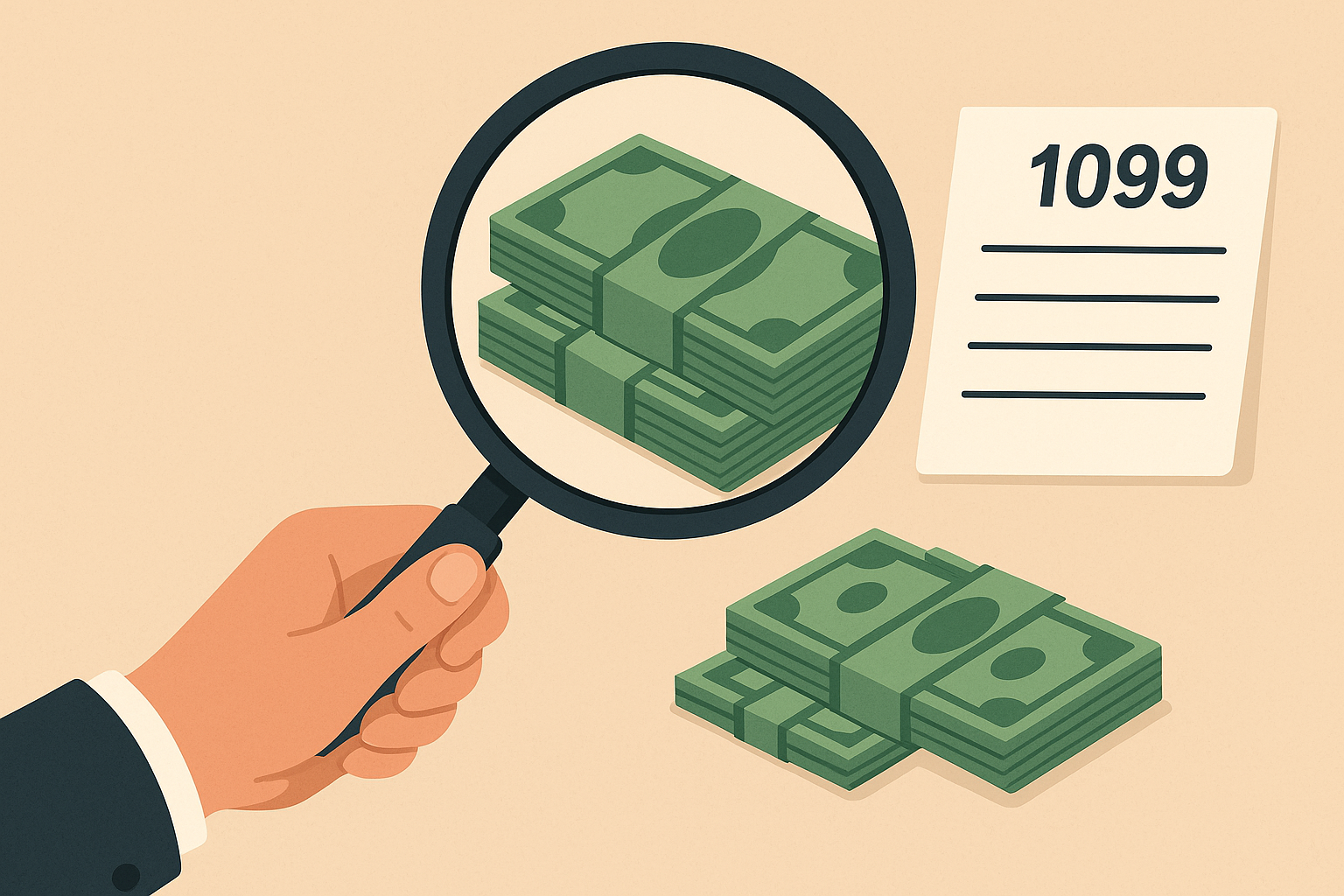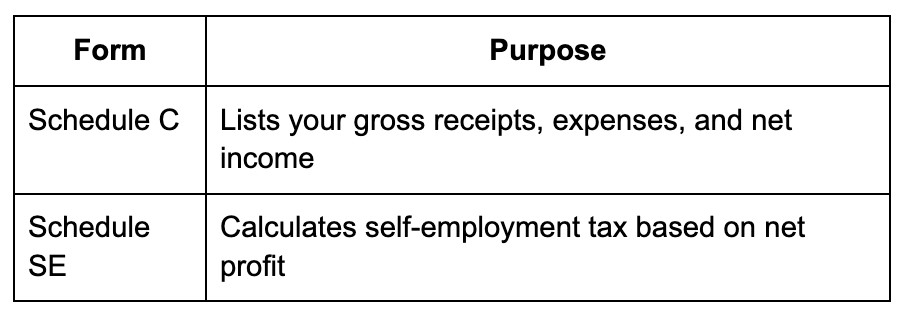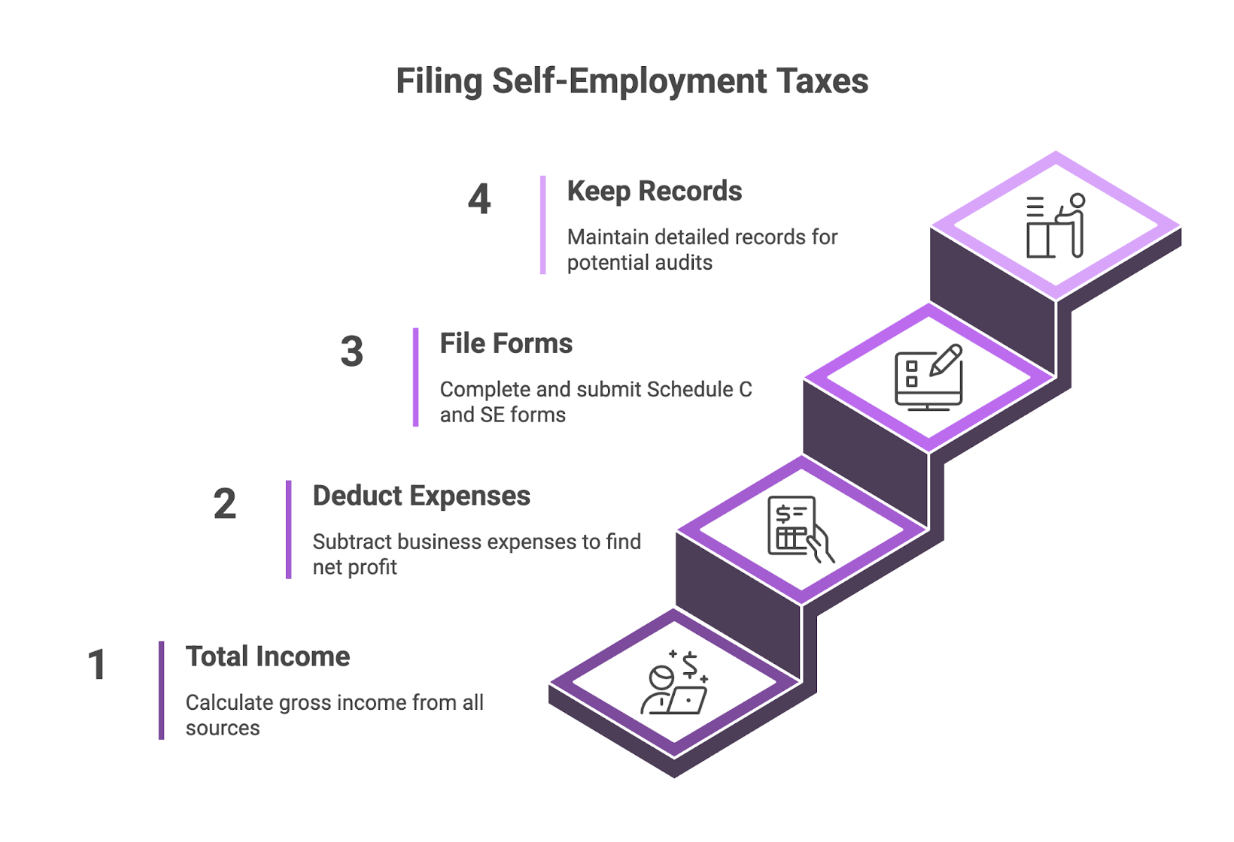If you worked for yourself this year, freelancing, consulting, selling online, or doing gig work, but didn't get a 1099 from every client, you're not alone.
And no, that doesn't mean you're off the hook with the IRS.
A lot of self-employed folks think they can't report income without a 1099 form. But here's the truth: the IRS requires you to report all self-employment income, whether or not someone sent you paperwork.
That includes:
This guide breaks down exactly how to report cash income without a 1099 in the picture, what forms to use, what counts as income, and how to avoid mistakes that trigger audits or penalties later.
If you're figuring this out last minute (or for the first time), take a breath, we'll walk you through it step by step.

Short answer: Yes. Every time.
This is one of the most common misunderstandings in self-employment taxes:
"If a client didn't send me a 1099, does that mean I don't have to report the income?"
Nope. It doesn't work like that.
If you earned the money, the Internal Revenue Service expects to see it, even if you never received a single form.
Think of 1099 forms as receipts the IRS uses to match income reports.
They help the IRS verify what you should be reporting, but they aren't what makes the income taxable income.
In fact, the IRS says this plainly:
"All income is taxable unless specifically excluded by law." (Source: IRS Self-Employed Individuals Tax Center)
So even if a client paid you less than $600 and didn't issue a form 1099-NEC, you still have to include that income on your return.
Even if the client used PayPal or Venmo and didn't file anything.
Even if it was paid in cash and never showed up in your inbox.
Even if they just "forgot."
The IRS doesn't need a form to expect the tax.
Let's be honest, lots of people think small unreported payments will slip through the cracks.
But here's what actually happens if you fail to report income:
Bottom line: the absence of a 1099 isn't protection. It's just a missing form.
You don't need to receive a 1099 form to file correctly.
You need accurate records and a little clarity on what to include.
Here's the thing no one tells you clearly: Every dollar you earn from self-employment is taxable income, even if there's no 1099 involved.
The IRS doesn't care whether the income was big or small, or whether it was reported on a 1099 by your clients. If you got paid for a service, you're expected to report it.
If you're working for yourself, whether full-time or on the side, the following all count as self-employment income that you need to report:
Yup, even that one-time $150 job someone paid you in cash counts.
This is what the IRS calls "gross receipts", the total amount of income you receive before any expenses, and it goes directly on Schedule C of your tax return.
There's a common myth that if a client doesn't send a form 1099-misc or form 1099-NEC, you don't have to report the income.
Not true. In fact, here's how it works:
In the IRS's eyes:
"Income is income. We don't need a form to tax it."
If you don't report all of your income, you could run into:
Even worse, if you get audited, they'll look at your bank deposits, not your 1099s. And if your income doesn't line up, you'll be answering some tough questions.
You don't need a form. You need good records.
Start by keeping:
Then total all of it and report that number on Schedule C.
And if your net income (after expenses) is over $400, you'll also file Schedule SE and pay self-employed tax. This covers social security and medicare taxes, even if no employer is withholding it for you.
As someone who practiced as a sole proprietor or operated any business you operated or profession during the tax year, you're required to file a federal tax return if your net earnings exceed certain thresholds.
Unlike employees who receive a W-2, self-employed individuals must track their own income and expenses throughout the year. This applies whether you received formal tax documents or not.
Generally, you're required to file if:
Even if the IRS doesn't require you to file based on your total income, you still have to file if you want to claim refundable credits or if you had taxes withheld from other sources.
Many self-employed people wonder how to report your cash income when clients don't provide proper documentation. The answer is simple: you must report all income you receive, regardless of whether you receive formal information returns.
This includes reporting cash income from any business you operated or profession you practiced, even if the total amount of income seems small. During tax season, it's crucial to gather all your records and ensure you're reporting everything accurately.
Okay, now let's get to the part that actually matters: How do you file your taxes if no one sent you a 1099?
Here's the step-by-step breakdown, plain and simple.
Even without a 1099, your job is to calculate your total self-employment income, everything you earned from self-employed work over the year.
To do that, gather:
If a client sent you 1099 income documentation, include that amount in your total. But don't rely on those forms alone, you need to add everything, not just what the IRS already sees.
This number, your total self-employment earnings, goes directly on Line 1 of Schedule C.
The IRS taxes your net income, not gross. So make sure you subtract all legitimate business expenses to lower your tax liability.
These tax deductions might include:
Document everything ideally with receipts, statements, or a spreadsheet that shows what was spent and why.
Once you subtract expenses from income, that gives you your net profit, which you actually owe tax on. These deductions can significantly reduce your tax burden.
If your net profit is $400 or more, you'll need to file a schedule that includes both:
Schedule C (Form 1040) – to report your business income and expenses Schedule SE (Form 1040) – to calculate your self-employment tax (15.3% for Social Security and Medicare)
These forms are built into most tax filing software, or you can download and fill them manually.
Here's what goes where:

Pro tip: If you expect to owe more than $1,000 in taxes this year, you may also need to make quarterly estimated tax payments to avoid penalties.
Even after you file your return, don't toss anything.
You should keep:
The IRS can audit up to 3 years back, and your best defense is a clean paper trail.
If your net profit is under $400, you're still expected to file a return and report that income, but you likely won't owe self-employed tax.
Just report the income on Schedule C and complete your regular 1040 return.
If you're dealing with complex business structures or multiple income streams, consulting with a tax professional or tax expert can be invaluable. They can help you understand the nuances of reporting 1099 and your cash payments, and ensure you're taking advantage of all available deductions.
A qualified professional can also help you plan for the upcoming tax year and set up systems to better track your income and expenses.
Tax professionals can help you:
At tax time, having professional guidance can save you both money and stress, especially if you're dealing with significant cash income without a 1099 or complex business situations.
Depending on your business structure, you may have different reporting requirements. Whether you operated or profession you practiced as a sole proprietor, LLC, or other entity affects how you file your return and calculate federal income taxes.
As you prepare your current year's taxes, consider implementing systems to better track income and expenses for the next tax year. This includes:

Self-employment doesn't come with a playbook. Clients might forget to send 1099s. Some pay you in cash, others through half a dozen apps. But that doesn't mean the IRS looks the other way.
If you earned income, it's your responsibility to report it, with or without a form.
And while that can feel intimidating, the reality is this: with solid records and the right guidance, it's absolutely doable.
Start by tracking every dollar, subtract what you've spent on your business, and file using Schedule C and SE.
You don't need perfection, you just need to be honest, accurate, and consistent.
And if you'd rather not go it alone?
That's where firms like Madras Accountancy come in. We work behind the scenes with U.S. accountants and founders to make sense of messy financials, including cash income without a 1099, contractor bookkeeping, and self-employment tax prep.
Whether you're juggling multiple income streams or trying to clean up last year's numbers, it helps to have a team that understands the real-world chaos of self-employment, and knows how to keep you compliant.
If you're figuring this out right now, Madras Accountancy(that is us 😉) can help.

A practical comparison of hiring a freelancer vs using a dedicated offshore accounting team, focusing on continuity, quality control, security, and scaling.

How CPA firms outsource payroll and 1099 work to reduce penalties and admin load, with a clean workflow for approvals, filings, and year-end reporting.

Practical do's and don'ts for CPA firms outsourcing accounting work, based on common failure points and what successful rollouts do differently.